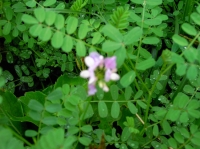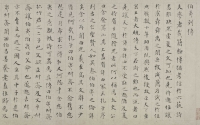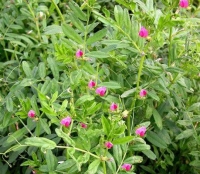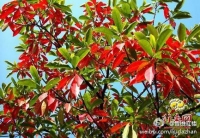吹笙鼓簧,承筐是将。人之好我,示我周行。
呦呦鹿鸣,食野之蒿。我有嘉宾,德音孔昭。
视民不恌,君子是则是效。我有旨酒,嘉宾式燕以敖。
呦呦鹿鸣,食野之芩。我有嘉宾,鼓瑟鼓琴。
鼓瑟鼓琴,和乐且湛。我有旨酒,以燕乐嘉宾之心。
Eating the celery of the fields.
I have here admirable guests;
The lutes are struck, and the organ is blown [for them]; --
The organ is blown till its tongues are all moving.
The baskets of offerings [also] are presented to them.
The men love me,
And will show me the perfect path.
With pleased sounds the deer call to one another,
Eating the southernwood of the fields.
I have here admirable guests;
Whose virtuous fame is grandly brilliant.
They show the people not to be mean;
The officers have in them a pattern and model.
I have good wine,
Which my admirable guests drink, enjoying themselves.
With pleased sounds the deer call to one another,
Eating the salsola of the fields.
I have here admirable guests;
For whom are struck the lutes, large and small.
The lutes, large and small, are struck,
And our harmonious joy is long-continued.
I have good wine,
To feast and make glad the hearts of my admirable guests.
【注释】 野鹿呦呦不停叫,
在那野外吃青苹。
我有高贵的宾客,
相邀弹瑟又吹笙。
吹笙鼓簧悦宾客,
礼品成筐送上来。
众位宾客关爱我,
为我指路多广阔。
野鹿呦呦不停叫,
在那野外吃青蒿。
我有高贵的宾客,
品德高尚声名好。
教人忠厚不轻伙,
君子循规要仿效。
我备美酒和佳肴,
宾客宴饮乐陶陶。
野鹿呦呦不停叫,
在那野外吃芩草。
我有高贵的宾客,
弹瑟奏琴勤相邀。
弹瑟奏琴勤相邀,
融洽欢欣乐尽兴。
我备美酒和佳肴,
宴乐宾客心愉悦。
1.呦(yōu)呦:鹿的叫声。朱熹《诗集传》:"呦呦,声之和也。"
2.苹:藾蒿。陆玑《毛诗草木鸟兽虫鱼疏》:"藾蒿,叶青色,茎似箸而轻脆,始生香,可生食。"
3.簧:笙上的簧片。笙是用几根有簧片的竹管、一根吹气管装在斗子上做成的。
4.承筐:指奉上礼品。毛传:"筐,篚属,所以行币帛也。"将:送,献。
5.周行(hánɡ):大道,引申为大道理。
6.蒿:又叫青蒿、香蒿,菊科植物。
7.德音:美好的品德声誉。孔:很。
8.视:同"示"。恌:同"佻"。
9.则:法则,楷模,此作动词。
10.旨:甘美。
11.式:语助词,同"宴"。敖:同"遨",嬉游。
12.芩(qín):草名,蒿类植物。
13.湛:深厚,毛传:"湛,乐之久。"
《鹿鸣》是古人在宴会上所唱的歌。朱熹《诗集传》云:“此燕(宴)飨宾客之诗也。”又云“岂本为燕(宴)群臣嘉宾而作,其后乃推而用之乡人也与?”也就是说此诗原是君王宴请群臣时所唱,后来逐渐推广到民间,在乡人的宴会上也可唱。朱熹这一推测该是符合事实的,直到东汉末年曹操作《短歌行》,还引用了此诗首章前四句,表示了渴求贤才的愿望,说明千余年后此诗还有一定的影响。
诗共三章,每章八句,开头皆以鹿鸣起兴。在空旷的原野上,一群糜鹿悠闲地吃着野草,不时发出呦呦的鸣声,此起彼应,十分和谐悦耳。诗以此起兴,便营造了一个热烈而又和谐的氛围,如果是君臣之间的宴会,那种本已存在的拘谨和紧张的关系,马上就会宽松下来。故《诗集传》云:“盖君臣之分,以严为主;朝廷之礼,以敬为主。然一于严敬,则情或不通,而无以尽其忠告之益,故先王因其饮食聚会,而制为燕飨之礼,以通上下之情;而其乐歌,又以鹿鸣起兴。”也就是说君臣之间限于一定的礼数,等级森严,形成思想上的隔阂。通过宴会,可以沟通感情,使君王能够听到群臣的心里话。而以鹿鸣起兴,则一开始便奠定了和谐愉悦的基调,给与会嘉宾以强烈的感染。
此诗自始至终洋溢着欢快的气氛,它把读者从“呦呦鹿鸣”的意境带进“鼓瑟吹笙”的音乐伴奏声中。《诗集传》云:“瑟笙,燕礼所用之乐也。”按照当时的礼仪,整个宴会上必须奏乐。《礼记·乡饮酒义》云:“工入升歌三终,主人献之。笙入三终,主人献之。间歌三终,合乐三终,工告乐备,遂出。……知其能和乐而不流也。”据陈澔注,乐工升堂,“歌《鹿鸣》、《四牡》、《皇皇者华》,每一篇而一终。三篇终,则主人酌以献工焉。”由此可知,整个宴会上是歌唱以上三首诗,而歌唱《鹿鸣》时又以笙乐相配,故诗云“鼓瑟吹笙”。乐谱虽早已失传,但从诗的语言看,此诗三章全是欢快的节奏,和悦的旋律,同曹操《短歌行》相比,曹诗开头有“人生苦短”之叹,后段有“忧从中来,不可断绝”之悲,唯有中间所引“鹿鸣”四句显得欢乐舒畅,可见《诗经》的作者对人生的领悟还没有曹操那么深刻。也许因为这是一首宴飨之乐,不容许杂以一点哀音吧。
诗之首章写热烈欢快的音乐声中有人“承筐是将”,献上竹筐所盛的礼物。献礼的人,在乡间宴会上是主人自己,说见上文所引《礼记》;在朝廷宴会上则为宰夫,《礼记·燕义》云:“设宾主饮酒之礼也,使宰夫为献。”足可为证。酒宴上献礼馈赠的古风,即使到了今天,在大宾馆的宴会上仍可见到。然后主人又向嘉宾致辞:“人之好我,示我周行。”也就是“承蒙诸位光临,示我以大道”一类的客气话。主人若是君王的话,那这两句的意思则是表示愿意听取群臣的忠告。诗之二章,则由主人(主要是君王)进一步表示祝辞,其大意则如《诗集传》所云:“言嘉宾之德音甚明,足以示民使不偷薄,而君子所当则效。”为什么祝酒之际要说出这样的话?分明是君主要求臣下做一个清正廉明的好官,以矫正偷薄的民风。如此看来,这样的宴会不徒为乐而已,它也带有一定的政治色彩。三章大部与首章重复,唯最后几句将欢乐气氛推向高潮。末句“燕乐嘉宾之心”,则是卒章见志,将诗之主题深化。也就是说这次宴会,“非止养其体、娱其外而已”,它不是一般的吃吃喝喝,满足口腹的需要,而是为了“安乐其心”,使得参与宴会的群臣心悦诚服,自觉地为君王的统治服务。
通过《鹿鸣》这首诗的简单分析,我们对周代宴飨之礼——包括宾主关系、宴乐概况,可以有一个大概的了解。
四牡騑騑,啴々骆马。岂不怀归?王事靡盬,不遑启处。
翩翩者鵻,载飞载下,集于苞栩。王事靡盬,不遑将父。
翩翩者鵻,载飞载止,集于苞杞。王事靡盬,不遑将母。
驾彼四骆,载骤骎骎。岂不怀归?是用作歌,将母来谂。
The way from Zhou was winding and tedious.
Did I not have the wish to return?
But the king's business was not to be slackly performed;
And my heart was wounded with sadness.
My four steeds advanced without stopping;
They panted and snorted, the white steeds black-maned.
Did I not have the wish to return?
But the king's business was not to be slackly performed;
And I had not leisure to kneel or to sit.
The Filial doves keep flying about,
Now soaring aloft, and now descending,
Collecting on the bushy oaks;
But the king's business was not to be slackly performed;
And I had not leisure to nourish my father.
The Filial doves keep flying about,
Now flying, now stopping,
Collecting on the bushy medlars;
But the king's business was not to be slackly performed;
And I had not leisure to nourish my mother.
I yoked my four white steeds, black-maned;
They hurried away with speed.
[But] did I not wish to return?
Therefore I make this song,
Announcing my wish to nourish my mother.
我马维驹,六辔如濡。载驰载驱,周爰咨诹。
我马维骐,六辔如丝。载驰载驱,周爰咨谋。
我马维骆,六辔沃若。载驰载驱,周爰咨度。
我马维骃,六辔既均。载驰载驱,周爰咨询。
On those level heights and the low grounds.
Complete and alert is the messenger, with his suite,
Ever anxious lest he should not succeed.
My horses are young;
The six reins look as if they were moistened.
I gallop them, and urge them on,
Everywhere pushing my inquiries.
My horses are piebald;
The six reins are like silk.
I gallop them, and urge them on,
Everywhere seeking information and counsel.
My horses are white and black-maned;
The six reins look glossy.
I gallop them, and urge them on,
Everywhere seeking information and advice.
My horses are grey;
The six reins are well in hand.
I gallop them, and urge them on,
Everywhere seeking information and suggestions.
死丧之威,兄弟孔怀。原隰裒矣,兄弟求矣。
脊令在原,兄弟急难。每有良朋,况也永叹。
兄弟阋于墙,外御其务。每有良朋,烝也无戎。
丧乱既平,既安且宁。虽有兄弟,不如友生?
傧尔笾豆,饮酒之饫。兄弟既具,和乐且孺。
妻子好合,如鼓瑟琴。兄弟既翕,和乐且湛。
宜尔室家,乐尔妻帑。是究是图,亶其然乎?
Are they not gorgeously displayed?
Of all the men in the world,
There are none equal to brothers.
On the dreaded occasions of death and burial,
It is brothers who greatly sympathize.
When fugitives are collected on the heights and low grounds,
They are brothers who will seek one another out.
There is the wagtail on the level height; --
When brothers are in urgent difficulties,
Friends, though they may be good,
Will [only] heave long sighs.
Brothers may quarrel inside the walls,
But they will oppose insult from without,
When friends, however good they may be,
Will not afford help.
When death and disorder are past,
And there are tranquillity and rest;
Although they have brothers,
[Some] reckon them not equal to friends.
Your dishes may be set in array,
And you may drink to satiety;
But it is when your brothers are all present,
That you are harmonious and happy, with child-like joy.
Loving union with wife and children,
Is like the music of lutes;
But it is the accord of brothers,
Which makes the harmony and happiness lasting.
For the ordering of your family,
For your joy in yor wife and children,
Examine this and study it; --
Will you not find that it is truly so?
相彼鸟矣,犹求友声。矧伊人矣,不求友生?神之听之,终和且平。
伐木许许,酾酒有藇!既有肥羜,以速诸父。宁适不来,微我弗顾。
於粲洒扫,陈馈八簋。既有肥牡,以速诸舅。宁适不来,微我有咎。
伐木于阪,酾酒有衍。笾豆有践,兄弟无远。民之失德,乾餱以愆。
有酒湑我,无酒酤我。坎坎鼓我,蹲蹲舞我。迨我暇矣,饮此湑矣。
And the birds cry out ying-ying.
One issues from the dark valley,
And removes to the lofty tree,
While ying goes its cry,
Seeking with its voice its companion.
Look at the bird,
Bird as it is, seeking with its voice its companion;
And shall a man,
Not seek to have his friends?
Spiritual beings will then hearken to him;
He shall have harmony and peace.
Xu-xu they go, as they fell the trees.
I have strained off my spirits, till they are fine,
And the fatted lambs are provided,
To which to invite my paternal uncles.
It is better that something should keep them from coming,
Than that I should not have regarded them.
Oh! brightly I have sprinkled and swept my courtyard,
And arranged my viands, with eight dishes of grain, along with my fatted meat,
To which to invite my maternal uncles.
It is better that something should keep them from coming,
Than that there should be blame attaching to me.
They fell down the trees along the hill-side.
I have strained off my spirits in abundance;
The dishes stand in rows,
And none of my brethren are absent.
The loss of kindly feeling among people,
May arise from faults in the matter of dry provisions.
If I have spirits I strain them, do I;
If I have no spirits, I buy them, do I;
I make the drums beat, do I;
I lead on the dance, do I.
Whenever we have leisure,
Let us drink the sparkling spirits.
天保定尔,俾尔戬穀。罄无不宜,受天百禄。降尔遐福,维日不足。
天保定尔,以莫不兴。如山如阜,如冈如陵,如川之方至,以莫不增。
吉蠲为饎,是用孝享。禴祠烝尝,于公先王。君曰:卜尔,万寿无疆。
神之吊矣,诒尔多福。民之质矣,日用饮食。群黎百姓,遍为尔德。
如月之恒,如日之升。如南山之寿,不骞不崩。如松柏之茂,无不尔或承。
With the greatest securtiy;
Makes thee entirely virtuous,
That thou mayest enjoy every happiness;
Grants thee much increase,
So that thou hast all in abundance.
Heaven protects and establishes thee,
It grants thee all excellence,
So that thine every matter is right,
And thou receivest every heavenly favour.
It sends down to thee long-during happiness,
Which the days are not sufficient to enjoy.
Heaven protects and establishes thee,
So that in every thing thou dost prosper,
Like the high hills, and the mountain masses,
Like the topmost ridges, and the greatest bulks;
That, as the stream ever coming on,
Such is thine increase.
With happy auspices and purifications, thou bringest the offerings,
And dost filially present them;
In spring, summer, autumn, and winter,
To the dukes and former kings,
Who says, " We give to thee,
Myriad of years of duration unlimited. "
The spirits come,
And confer on thee many blessings.
The people are simple and honest,
Daily enjoying their meat and drink.
All the black-haired race, in all their surnames,
Universally practise your virtue.
Like the moon advancing to the full,
Like the sun ascending the heavens,
Like the age of the southern hills,
Never waning, never falling,
Like the luxuriance of the fir and the cypress; --
May such be thy succeeding line!
靡室靡家,玁狁之故。不遑启居,玁狁之故。
采薇采薇,薇亦柔止。曰归曰归,心亦忧止。
忧心烈烈,载饥载渴。我戍未定,靡使归聘。
采薇采薇,薇亦刚止。曰归曰归,岁亦阳止。
王事靡盬,不遑启处。忧心孔疚,我行不来!
彼尔维何?维常之华。彼路斯何?君子之车。
戎车既驾,四牡业业。岂敢定居?一月三捷。
驾彼四牡,四牡骙々。君子所依,小人所腓。
四牡翼翼,象弭鱼服。岂不日戒?玁狁孔棘(亟)!
昔我往矣,杨柳依依。今我来思,雨雪霏霏。
行道迟迟,载渴载饥。我心伤悲,莫知我哀!
The thorn-ferns are now springing up.
When shall we return? When shall we return?
It will be late in the [next] year.
Wife and husband will be separated,
Because of the Xian-yun.
We shall have no leisure to rest,
Because of the Xian-yun.
Let us gather the thorn-ferns, let us gather the thorn-ferns;
The thorn-ferns are now tender.
When shall we return? When shall we return?
Our hearts are sorrowful;
Our hearts are sad and sorrowful;
We shall hunger, we shall thirst.
While our service on guard is not finished,
We can send no one home to enquire about our families.
Let us gather the thorn-ferns, let us gather the thorn-ferns;
The thorn-ferns are now hard.
When shall we return? When shall we return?
The year will be in the tenth month.
But the king's business must not be slackly performed;
We shall have no leisure to rest.
Our sorrowing hearts are in great distress;
But we shall not return from our expedition.
What is that so gorgeous?
It is the flowers of the cherry tree.
What carriage is that?
It is the carriage of our general.
His war carriage is yoked;
The four steeds are strong.
Dare we remain inactive?
In one month we shall have three victories.
The four steeds are yoked,
The four steeds, eager and strong; --
The confidence of the general,
The protection of the men.
The four steeds move regularly, like wings; --
There are the bow with its ivory ends, and the seal-skin quiver.
Shall we not daily warn one another?
The business of the Xian-yun is very urgent.
At first, when we set out,
The willows were fresh and green;
Now, when we shall be returning,
The snow will be falling in clouds.
Long and tedious will be our marching;
We shall hunger; we shall thirst.
Our hearts are wounded with grief,
And no one knows our sadness.
召彼仆夫,谓之载矣。王事多难,维其棘矣。
我出我车,于彼郊矣。设此旐矣,建彼旄矣。
彼旟旐斯,胡不旆旆?忧心悄悄,仆夫况瘁。
王命南仲,往城于方。出车彭彭,旂旐央央。
天子命我,城彼朔方。赫赫南仲,玁狁于襄。
昔我往矣,黍稷方华。今我来思,雨雪载途。
王事多难,不遑启居。岂不怀归?畏此简书。
喓々草虫,趯趯阜螽。未见君子,忧心忡忡。
既见君子,我心则降。赫赫南仲,薄伐西戎。
春日迟迟,卉木萋萋。仓庚喈喈,采蘩祁祁。
执讯获丑,薄言还归。赫赫南仲,玁狁于夷。
To those pasture grounds.
" From the place of the son of Heaven,
Came an order to me to march, " [said the general].
So he called his carriage-officers,
And told them to get the carriages all ready.
" The king"s business, " [said he], " is surrounded with difficulties;
We must use despatch. "
We proceeded with our carriage,
To that suburban region.
The banner with tortoises and serpents was raised,
And the ox-tails set up at the top of its staff;
Did not it and the falcon banner,
Fly about grandly?
The [general"s] heart was anxious and sad,
And the carriage-officers appeared full of care.
The king charged Nan Zhong,
To go and build a wall in the [disturbed] region.
How numerous were his chariots!
How splendid his dragon, his tortoise and serpent flags!
The son of Heaven had charged us,
To build a wall in that northern region.
Awe-inspiring was Nan Zhong;
The Xian-yun were sure to be swept away!
When we were marching at first,
The millets were in flower.
Now that we are returning,
The snow falls, and the roads are all mire.
The king"s business was not to be slackly performed,
And we had not leisure to rest.
Did we not long to return?
But we were in awe of the orders in the tablets.
" Yao-yao go the grass-insects,
And the hoppers leap about.
While we do not see our husbands,
Our hearts must be full of grief.
Let us but see our husbands,
And our hearts will be at rest. "
The awe-inspiring Nan Zhong,
Is smiting the Rong of the west.
The spring-days are lengthening out;
The plants and trees grow full of verdure;
The oriole"s cry comes jie-jie;
[Our wives] go in crowds to gather the white southernwood.
With our prisoners for the question and our captive crowd,
We return.
Awe-inspiring is Nan zhong;
The Xian-yun are pacified.
有杕之杜,其叶萋萋。王事靡盬,我心伤悲。卉木萋止,女心悲止,征夫归止!
陟彼北山,言采其杞。王事靡盬,忧我父母。檀车幝々,四牡痯々,征夫不远!
匪载匪来,忧心孔疚。斯逝不至,而多为恤。卜筮偕止,会言近止,征夫迩止!
With its fruit so bright.
The king's business must not be slackly performed,
And the days are prolonged with us one after another.
The sun and moon are in the tenth month.
My woman's heart is wounded;
My soldier might have leisure [to return]!
Solitary stands the russet pear tree,
With its leaves so luxuriant.
The king's business must not be slackly performed,
And my heart is wounded and sad.
The plants and trees are luxuriant,
But my heart is sad.
O that my soldier might return!
I ascended that hill in the north,
To gather the medlars.
The king's business must not be slackly performed,
And our parents are made sorrowful.
His chariot of sandal wood must be damaged;
His four horses must be worn out;
My soldier cannot be far off.
They have not packed up, they do not come;
My sorrowing heart is greatly distressed.
The time is past, and he is not here,
To the multiplication of my sorrows.
Both by the tortoise shell and the reeds have I divined,
And they unite in saying he is near.
My soldier is at hand!





